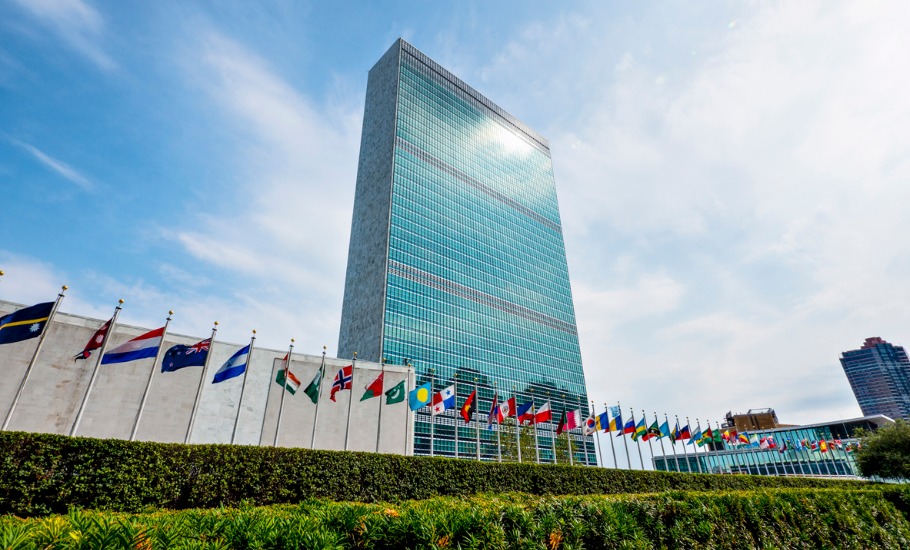
India declines UN's integrated supply chain offer, says its system robust
India has declined the United Nations' offer to use their integrated supply chain for COVID-19-related material, saying they have a "robust system" in place to deal with the required logistics

India has declined the United Nations’ offer to use their integrated supply chain for COVID-19-related material, saying they have a “robust system” in place to deal with the required logistics.
This was revealed by Farhan Haq, Deputy Spokesman for the UN Chief to PTI. The spokesperson for UN Secretary General Antonio Guterres said that the UN had offered India to tap into their integrated supply chain if it was required. But, they have been told that it was not needed because India has a reasonably robust system to deal with this.
Haq however added that their offer still stands and they are willing to help in whatever way they can.
To a question on whether any shipments of essential materials from UN agencies are expected to reach India amid the second wave raging in the country, Haq said that nothing has been sought by India. However, he said that they have resources, including their people who deal with “operational and logistical issues” who are willing to help. And, that they were talking to their counterparts in India to check if they can be useful on this front.
Also read: COVID crisis: Singapore, Canada rush to India’s help with financial aid, oxygen
This offer of help from the UN comes in the wake of a comment made by Dr Anthony Fauci, the White House’s chief medical adviser, who said that countries across the world have failed to provide an adequate global support to help India fight the ongoing crisis. India has 29,78,709 active COVID-19 cases and more than 2 lakh citizens have succumbed to the disease, according to Ministry of Health figures on Wednesday (April 28).
As India battles a crippling surge in COVID-19 infections and deaths, the United Nations has been in touch at various levels with authorities in India. Haq said senior officials have been in touch with India’s Permanent Representative to the UN, T S Tirumurti, over the COVID-19 situation in India.
Haq added that the UN is also ensuring that their own staff, whether international or national, in India are being taken care of to avoid being a burden to the country’s healthcare system. And, they have maintained a very low level of cases and ensured not to pressurise a healthcare system already facing extreme challenges.
Earlier, during the daily press briefing on Tuesday (April 27), Haq had said that UN colleagues on the ground were continuing to support authorities and communities to tackle the impacts of the pandemic. Health workers were being trained, including 10,000 nurses through UN Women initiatives and the UN team has also partnered with employers and workers’ organisations to foster more jobs and entrepreneurship opportunities, Haq pointed out.
Also read: World failed India, says US top medic Fauci, praises Covaxin’s efficacy
Eleven help desks and on-site counselling activities on COVID-19 prevention and business continuity were set up by the UN Development Programme (UNDP), the UN Industrial Development Organisation (UNIDO) and the International Labour Organisation (ILO). These services have helped over 140,000 employees.
Haq also gave other examples such as UNIDO having developed an online platform to help smaller companies bounce back from the crisis and ILO’s efforts to help 100,000 self-employed workers to access social security measures and training on safety and health.
The UN was also focusing on getting jobs for 10 million young people, added Haq. Moreover, over 13,000 women and youth, including returnee migrants, were being trained through entrepreneurship programmes led by UN Women and ILO, he said. Besides, he also spoke about a web portal to encourage e-commerce ventures from the UN Economic and Social Commission for Asia and the Pacific (ESCAP) has benefitted 950 women entrepreneurs in small and medium businesses.
On a question about the resurgence of the COVID-19 variant in India and whether major political rallies or religious festivals should be held during the pandemic, Haq hedged and repliedd that he would leave it to his colleagues at the World Health Organisation to provide a “more formal evaluation”.
The UN has been stressing to countries the importance of following all the various precautions recommended by the World Health Organization and they would like to see that it is followed through by every country. It has become clear, Haq said that at this stage that the COVID-19 pandemic won’t be solved for any country until each country confronts and defeats it in every country.
Haq added that “we have to remain vigilant” though many places were thankfully making progress with measures, including vaccinations or local quarantines or other different precautions. Then Haq went on to quote the Secretary-General who had asked for all nations to cooperate with each other to ensure that COVID-19 is defeated in every nation. That is “because you can always get areas, different countries or different variant strains, that can, again, cause a huge problem, not just for one nation but for regions and, ultimately, for the world,” Haq said.
Also read:On telephone call, Biden assures Modi of vaccine raw materials
Meanwhile, the President of the UN General Assembly, who expressed his worry over India’s rising COVID-19 cases, urged the world to extend help and support to the country, which had supplied crucial COVID-19 vaccines to vulnerable nations.
“Its time for the world to extend aid & support to India. No one’s safe until we are all safe,” tweeted Volkan Bozkir, the President of the 75th session of the United Nations General Assembly. Besides, he added that his thoughts were with the people of India at this time. Tirumurti replied to Bozkirs tweet, stating that India deeply appreciates his “sentiments and solidarity at this juncture.”

